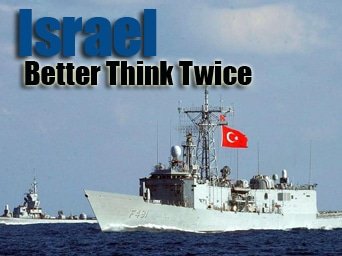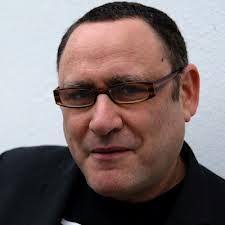by Gilad Atzmon
As the rift between Israel and Turkey deepens, the Israeli media is preparing its crowd for another possible exciting bloody conflict.
Israel’s leading news outlet Ynet, published yesterday a detailed comparison between Israel’s and Turkey’s military capacity – it outlines the size of the air force, navy, ground forces in the respective countries. “Turkey”, it says, “posses much bigger navy but our air force is larger.’
I guess that this is what one would expect from Israel, a morbid collective driven by war enthusiasm and some bizarre craving for bloody conflict.
We have to remember, that at least on the face of it, this new emerging rift between Israel and Turkey, is not about land, oil or assets. It is all about apology. Relations between the two old allies have soured further in recent days after the publication of the UN investigation into Israel’s murderous assault on a Turkish Mavi Marmara in high seas. In the attack nine peace activists were murdered; some of them were clearly executed in cold blood. Turkey demands Israel’s. apology. For some reason Israel failed to react. The meaning of it is simple. Israel prefers the prospect of a violent development instead of confronting its sin.
I will make myself as simple, short and clear just to make sure that the Israelis and their allies around the world understand how futile their agenda is.
Islam is unbeatable and indestructible. The Israelis should remember their latest military blunders. In 2006 its army was humiliated by the Hezbula, a small Lebanese paramilitary organisation. In just a few weeks the heroic Hezbollah managed to bring Israel to its knees. In 2008-9 Israeli Army mounted a massive attack on Gaza, the initial objective was to dismantle the democratically elected Hamas. Israel murdered more than 1400 Palestinians but it achieved none of its military objectives. Hamas and Hezbollah won these battles without air force, navy or tanks. In fact resilience was enough to defeat the IDF.
But Israel is not alone, The English speaking Empire is also heavily beaten in Iraq and Afghanistan. Similarily, Iraqi insurgency and Taliban do not posses tanks, F 16s or submarines. In the age of Islamic resistance, tables of contents with numbers of tanks, vessels, and airplanes are obsolete. It is the spirit and the will rather than the tank that wins the battle. This spirit better be called The Islam Spring, and it is unbeatable indeed.
The message for Israelis is plainly clear. Israel and its supporting lobbies had better learn how to contain their inherent violent tendencies. Israel cannot win this battle. The sooner the Israelis encompass this obvious fact, the better it is for Israel and for world peace.
You can now pre-order Gilad Atzmon’s New Book: The Wandering Who? on Amazon.com or Amazon.co.uk
Clinton expresses determination to resolve Israeli- Palestinian conflict. ‘We cannot give up on peace,’ she tells confirmation hearing
Jerusalem Post January 14, 2009 | HILARY LEILA KRIEGER, Jerusalem Post correspondent HILARY LEILA KRIEGER, Jerusalem Post correspondent Jerusalem Post 01-14-2009 Headline: Clinton expresses determination to resolve Israeli- Palestinian conflict. ‘We cannot give up on peace,’ she tells confirmation hearing Byline: HILARY LEILA KRIEGER, Jerusalem Post correspondent Edition; Daily Section: News Page: 01
Wednesday, January 14, 2009 — WASHINGTON – Recalling the many failed attempts – including her husband’s – to resolve the Israeli- Palestinian conflict, US Secretary of State-designate Hillary Clinton declared during her confirmation hearings Tuesday that “we cannot give up on peace.”
Speaking to the Senate Foreign Relations Committee, which must approve her nomination, Clinton stressed that US President-elect Barack Obama and she herself “understand and are deeply sympathetic to Israel’s desire to defend itself under the current conditions, and to be free of shelling by Hamas rockets.”
She added that the current conflict served as a reminder of the “tragic humanitarian costs” and described herself as “pained by the suffering of Palestinian and Israeli civilians.” site israeli palestinian conflict
Despite the unsuccessful efforts by previous American leaders, including former president Bill Clinton, Hillary Clinton said that these current realities “must only increase our determination to seek a just and lasting peace agreement.”
In response to the humanitarian crisis faced by Palestinians, the US State Department today announced a donors’ conference to raise funds for their needs. The conference is to be hosted by the Czech Republic, which holds the rotating EU presidency.
After Clinton’s introductory remarks, which included her comments on the Israeli-Palestinian conflict, her first question from the new chairman of the US Senate Foreign Relations Committee, John Kerry, focused on Iran and its nuclear ambitions.
“Our goal will be to do everything we can to pursue, through diplomacy, through the use of sanctions, through creating better coalitions with countries that we believe also have a big stake in preventing Iran from becoming a nuclear-weapon power, to try to prevent this from occurring,” she said of the incoming administration’s policy on Iran.
“We are not taking any option off the table at all, but we will pursue a new, perhaps different approach that will become a cornerstone of what the Obama administration believes is an attitude toward engagement that might bear fruit.”
But, she continued, “We have no illusions, Mr. Chairman, that even with a new administration, looking to try to engage Iran in a way that might influence its behavior, that we can predict the results.”
Clinton would not discuss what type of contacts the Obama administration might hold with Teheran – including whether she herself would participate – saying the policy options are still being reviewed.
But when pressed on her attitude toward an Iranian nuclear weapon, she stressed, “The president-elect has been very clear that it is unacceptable and that is our premise and that is what we are going to be basing our actions on.” go to web site israeli palestinian conflict
When asked about engagement with the Palestinians, Clinton upheld the Middle East Quartet’s three demands as “absolute” before any talks could be held with the Islamist group.
“You cannot negotiate with Hamas until it renounces violence, recognizes Israel and agrees to abide by past agreements,” she said. “That is the United States government’s position. That is the president-elect’s position.”
Her comments on Israel and Hamas were some of the few to elicit audience reaction, as a handful of protesters held signs calling for a cease-fire in Gaza.
During a break in the hearing, which was still continuing at press time, the demonstrators became louder, calling on Clinton to speak up for the people of Gaza.
Clinton was testifying in a packed committee room, where congressional staff, diplomats and Middle East experts filled the public seating, while Clinton herself was backed by aides and her daughter, Chelsea.
Bill Clinton was watching in another location, but his presence was felt throughout the hearing as senators, most of them Republican, mentioned the potential conflict of interest arising from foreign donations to his global works foundation.
As part of the process clearing the way for Clinton to become secretary of state, the Clinton Foundation agreed to release a list of donors and to reject any gifts from foreign governments.

Gilad Atzmon is an Israeli-born British jazz saxophonist, novelist, political activist and writer.
Atzmon’s album Exile was BBC jazz album of the year in 2003. Playing over 100 dates a year,[4] he has been called “surely the hardest-gigging man in British jazz.” His albums, of which he has recorded nine to date, often explore the music of the Middle East and political themes. He has described himself as a “devoted political artist.” He supports the Palestinian right of return and the one-state solution in the Israeli-Palestinian conflict.
His criticisms of Zionism, Jewish identity, and Judaism, as well as his controversial views on The Holocaust and Jewish history have led to allegations of antisemitism from both Zionists and anti-Zionists. A profile in The Guardian in 2009 which described Atzmon as “one of London’s finest saxophonists” stated: “It is Atzmon’s blunt anti-Zionism rather than his music that has given him an international profile, particularly in the Arab world, where his essays are widely read.”
His new book The Wandering Who? is now availble at Amazon.com
ATTENTION READERS
We See The World From All Sides and Want YOU To Be Fully Informed
In fact, intentional disinformation is a disgraceful scourge in media today. So to assuage any possible errant incorrect information posted herein, we strongly encourage you to seek corroboration from other non-VT sources before forming an educated opinion.
About VT -
Policies & Disclosures -
Comment Policy
Due to the nature of uncensored content posted by VT's fully independent international writers, VT cannot guarantee absolute validity. All content is owned by the author exclusively. Expressed opinions are NOT necessarily the views of VT, other authors, affiliates, advertisers, sponsors, partners, or technicians. Some content may be satirical in nature. All images are the full responsibility of the article author and NOT VT.





